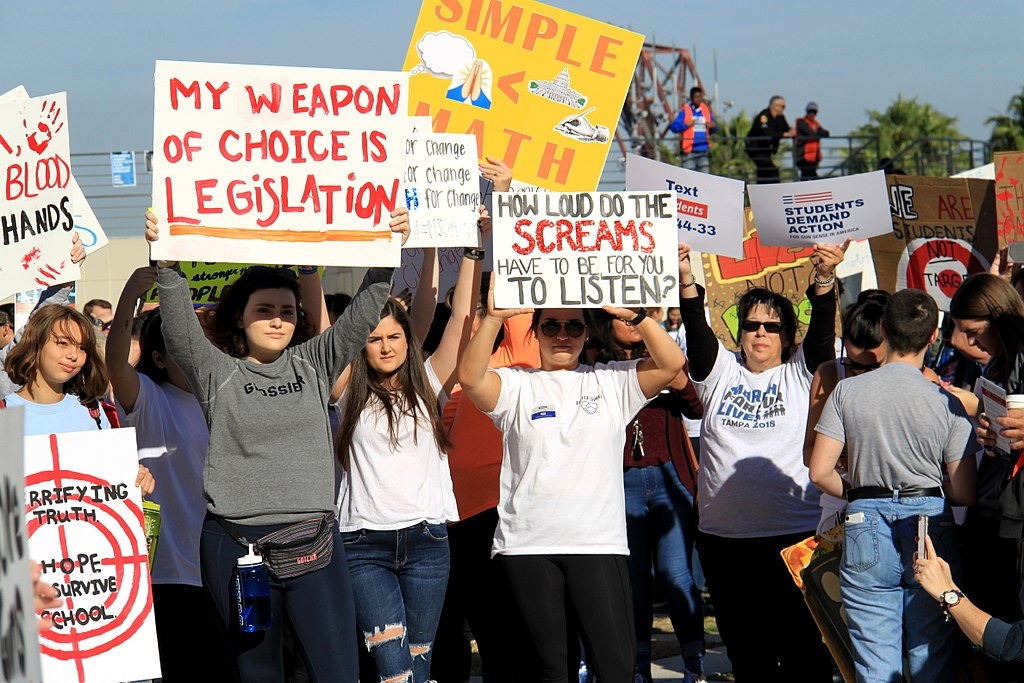Florida assault weapons ban amendment faces high hurdles

Protestors rallied for gun violence prevention measures in Tampa, Florida, during the March 2018 March for Our Lives events following the school shooting in Parkland. Activists are now working to pass a constitutional amendment to try to curb gun violence in the state. (Photo by Joseph Brent via Flickr.)
The recent massacres in Dayton, Ohio, and El Paso, Texas, have intensified efforts in many states to regulate assault weapons — semiautomatic firearms with large magazines of ammunition that were designed for combat use.
Before the latest massacres, reform efforts were already underway in Florida. The state was the site of two high-profile mass shootings in recent years: the 2016 massacre at Pulse nightclub in Orlando in which 49 people were killed, and the 2018 incident at Marjory Stoneman Douglas High School in Parkland that left 17 students and teachers dead.
The murderers in both cases used assault rifles. In response, gun-control activists are seeking to place a constitutional amendment on the Florida ballot in 2020 to ban assault weapons that can shoot more than 10 rounds. The measure would not apply to handguns.
If the amendment passes, Florida would become the only state in the South to ban assault weapons, and Floridians who currently have such weapons would have to register them. After the Parkland shooting, the Florida legislature passed a gun reform law that, among other things, banned "bump stocks" that allow rapid firing.
The group pushing for the amendment, Ban Assault Weapons Now (BAWN), has collected 100,000 signatures so far to get the amendment on the ballot next year. In the next six months, the group must collect an additional 666,200 signatures.
BAWN must also comply with a new state law that puts stringent requirements on signature collectors and requires that the ballots list the percentage of money raised by amendment sponsors from out-of-state donors. For some amendments, the ballot would have to include information on the potential economic or fiscal impact; that impact is now being calculated for the proposed weapons ban.
Gail Schwartz, whose nephew was killed in the Parkland shooting, leads BAWN's efforts. She criticized the new barriers to citizen amendments in a recent press conference. "I think it's unfortunate that the Florida legislature wants to prevent Floridians from having a say in the types of weapons that we want sold in this state," she said. "I wish an assault weapons ban had been in place before Pulse. We could have saved 49 lives."
Last week, an effort to amend the Florida constitution to expand Medicaid was delayed until at least 2022, and a spokesperson for the group sponsoring the amendment blamed the legislature. "It is clear that Floridians overwhelmingly support Medicaid expansion, but state legislative changes at the end of the (legislative) session just made that a hill too steep to climb," said Dan Newman.
Though half of all states allow citizen-initiated amendments, Florida and Arkansas are the only Southern states where citizens can amend the constitution without going through the legislature. Both states have "geographic distribution" requirements, which means signatures for citizen amendments must come from a certain number of counties.
Arkansas legislators have placed an amendment on the ballot next year that would make the distribution requirement more onerous. If it passes, sponsors of progressive amendments would have to get more support in rural counties.
Florida's new restrictions on ballot measures come as activists are also collecting signatures to increase the statewide minimum wage and open up electric utility monopolies to competition. Last year, Florida voters amended the constitution to restore voting rights to more than a million people with felony convictions, but the legislature then passed a law requiring them to pay all court fines and fees before their voting rights are restored — a measure that has been described as a poll tax.
Before any amendments go on the 2020 ballot, the Florida Supreme Court has to approve the ballot language. Attorney General Ashley Moody (R) recently argued to the court that BAWN's proposed ballot language is misleading. Among other things, Moody said the language doesn't inform voters that owners of assault weapons would have to register with the state, even though the ballot would state that the amendment "requires registration of assault weapons lawfully possessed" before it goes into effect.
Moody also claimed that the ballot language for the energy competition amendment is misleading. She told the Florida Supreme Court that "the undisclosed chief purpose of the proposed amendment is to eliminate … the investor-owned utilities."
A North Carolina court ruled last year that the ballot language for two proposed constitutional amendment was misleading. One of the amendments would have radically altered the separation of powers in the state constitution, without telling voters. The legislature replaced the amendment with a scaled-back version, which voters rejected.
In Florida, the state Supreme Court became much more conservative when Gov. Ron DeSantis (R) was sworn in this year and filled three of the court's seven seats. If the court signs off on the assault weapon ban proposal and voters pass it, the court would be in charge of deciding when the amendment has been violated.
Tags
Billy Corriher
Billy is a contributing writer with Facing South who specializes in judicial selection, voting rights, and the courts in North Carolina.
